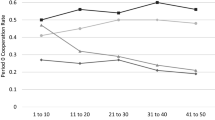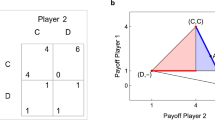Abstract
An intuitive expectation is that in a finitely repeated prisoner's dilemma, the players will achieve mutual cooperation in at least some periods. Existing explanations for equilibrium cooperation (with agents perfectly informed of one another's characteristics) require that the number of repetitions be unknown, which is in many cases an uncomfortably strong uncertainty assertion. This paper demonstrates that if agents have private information concerning the number of repetitions (as opposed to being completely uninformed), equilibrium mutual cooperation can occur in a finitely repeated game. This appears to be a weaker and more palatable assumption then that of complete uncertainty, and hence provides a natural and useful alternative foundation for mutual cooperation.
Similar content being viewed by others
References
Aumann R (1959) Acceptable points in general cooperativen-person games. In: Tucker AW, Luce RD (eds) Contributions to the theory of games IV. Annuals of Mathematics Studies 40, Princeton University Press, pp 287–324
Benoit J-P, Krishna V (1985) Finitely repeated games. Econometrica 53:905–922
Friedman J (1971) A non-cooperative equilibrium for supergames. Review of Economic Studies 38(1):1–12
Kreps D, Milgrom P, Roberts J, Wilson R (1982) Rational cooperation in the finitely repeated prisoner's dilemma. Journal of Economic Theory 27:245–252
Kreps D, Wilson R (1982) Sequential equilibria. Econometrica 50:863–894
Kurz M (1978) Altruism as an outcome of social iteration. American Economic Review 68(2): 216–222
Luce R, Raiffa H (1957) Games and decisions. John Wiley & Sons, NY
Milgrom P (1981) An axiomatic characterization of common knowledge. Econometrica 51:219–222
Owen G (1982) Game theory second ed. Saunders, Philadelphia
Porter R (1983) Optimal cartel trigger price strategies. Journal of Economic Theory 29:313–338
Radner R (1980) Collusive behavior in noncooperative epsilon-equilibria of oligopolies with long but finite lives. Journal of Economic Theory 22(2):136–154
Rosenthal R (1980) New equilibria for noncooperative two-person games. Journal of Mathematical Sociology 7(1):15–26
Rubinstein A (1979) Equilibrium in supergames with the overtaking criterion. Journal of Economic Theory 21:1–9
Rubinstein A (1980) Strong perfect equilibrium. International Journal of Game Theory 9:1–12
Sanghvi A, Sobel M (1976) Bayesian games as stochastic processes. International Journal of Game Theory 5(1):l-22
Selten R (1975) Reexamination of the perfectness concept for equilibrium points in extensive games. International Journal of Game Theory 4:22–55
Selten R (1978) The chain store paradox. Theory and Decision 9(1):127–159
Smale S (1980) The prisoner's dilemma and dynamical systems associated to non-cooperative games. Econometrica 48(7): 1617–1634
Author information
Authors and Affiliations
Additional information
I am indebted to an anonymous referee for helpful comments, which led (among other improvements) to the clarification of Proposition 1 and the proof of Proposition 2. Errors remain my responsibility. Financial support from the National Science Foundation is gratefully acknowledged.
Rights and permissions
About this article
Cite this article
Samuelson, L. A note on uncertainty and cooperation in a finitely repeated prisoner's dilemma. Int J Game Theory 16, 187–195 (1987). https://doi.org/10.1007/BF01756290
Received:
Revised:
Issue Date:
DOI: https://doi.org/10.1007/BF01756290




